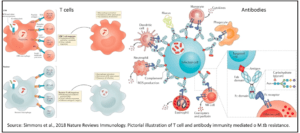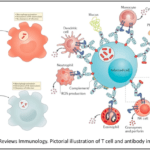 Mycobacterium tuberculosis (M.tb) infection is defined by the absence of TB symptoms and microbiological M.tb evidence but detection of immunological memory to M.tb antigens using tuberculin skin tests (TSTs) or IFN-𝛾-release assays (IGRAs). Studies have shown that in spite of high TB exposure, some individuals [e.g. healthcare workers, household TB contacts (HHC) and gold miners] remain M.tb uninfected and have been termed resisters. Immune profiling of resisters suggest that innate immunity sufficiently clear M.tb without induction of adaptive immunity. Lu et al., aimed determine non-classical M.tb-specific adaptive immunity associated with M.tb resistance by measuring immune responses from a Ugandan cohort of HHC resisters.
Mycobacterium tuberculosis (M.tb) infection is defined by the absence of TB symptoms and microbiological M.tb evidence but detection of immunological memory to M.tb antigens using tuberculin skin tests (TSTs) or IFN-𝛾-release assays (IGRAs). Studies have shown that in spite of high TB exposure, some individuals [e.g. healthcare workers, household TB contacts (HHC) and gold miners] remain M.tb uninfected and have been termed resisters. Immune profiling of resisters suggest that innate immunity sufficiently clear M.tb without induction of adaptive immunity. Lu et al., aimed determine non-classical M.tb-specific adaptive immunity associated with M.tb resistance by measuring immune responses from a Ugandan cohort of HHC resisters.
Researchers hypothesised that resisters possessed undetectable M.tb-specific antibodies reflecting their negative TST and IGRA results. To their surprise, Lu et al., detected mycobacteria-specific IgM, IgG and IgA antibodies (Abs) in resistors at similar levels as matched M.tb infected individuals (LTBI). Detected Ab responses were reactive to mycobacteria antigens as well as CFP10/ESAT6, antigens found in M.tb but not BCG nor other mycobacteria sp.. These results indicate that though resisters were TST/IGRA negative, they were exposed to M.tb and exposure was able to induce durable class-switched Ab responses. Further , Lu et al., demonstrated that Ab responses in resisters had undergone affinity maturation, demonstrated by increased Ab avidity to mycobacterial antigens in resisters compared to LTBI.
Lu et al., also conducted T cell immunophenotyping by measuring IFN-𝛾, IL2, TNF, IL-4, IL17a, CD107a (cytotoxic) and CD154/CD40L functional responses in response to mycobacterial antigen stimulation. As expected M.tb-specific CD4 T cells from resistors were predominantly IFN-𝛾-independent dominated by expression of CD154/CD40L (with or without IL2/TNF expression), even in response to CFP10/ESAT6 stimulation. CD40L is a member of the TNF superfamily receptors, and its interaction with CD40 in B cells, has been associated with improving B cells responses. Thus, suggesting a potential role of T cell mediated CD40L B cell help, that lead to increased B cell maturation and activity.
In summary, Lu et al., demonstrate that resistors possess a distinct adaptive immune phenotype illustrated by detection of mature Ab responses and CD40L expressing (IFN-𝛾 -ve) T cells reactive to mycobacterial antigens including CFP10/ESAT6. This illustrates that resistors are indeed M.tb sensitised, and warrant the need to potentially revise/update the definition of M.tb-sensitisation/infection.
Article: Lu et al., 2019. IFN-𝛾-independent immune markers of Mycobacterium tuberculosis exposure. Nature Medicine
.
